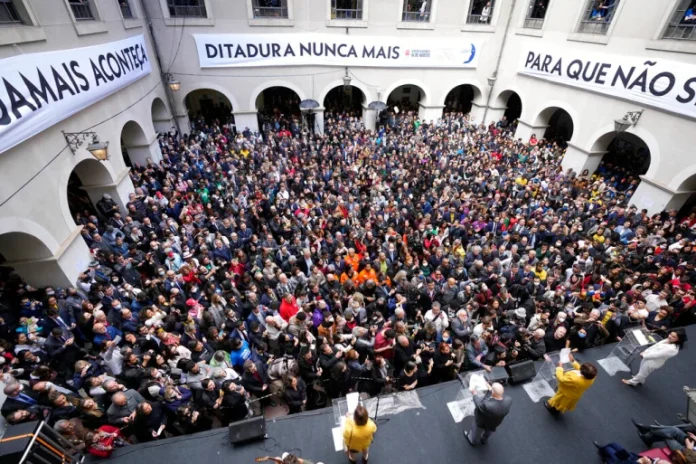When Jair Bolsonaro reached Brazil’s presidential runoff election in 2018, he had broad support from the top ranks of the country’s financial sector. His University of Chicago-trained economic advisor, Paulo Guedes, vowed to cut taxes and improve the country’s business environment. In the years since, decision-makers on Faria Lima Avenue in São Paulo—known as Brazil’s Wall Street—often kept quiet as the Bolsonaro presidency careened from one crisis to the next, presumably in the hopes that the economic reforms promised by Guedes—who became Bolsonaro’s economics minister—would come to pass.
Now, with another presidential election approaching on Oct. 2, many in Brazil’s business class have taken a different position. For months, Bolsonaro has lagged in polls against his main opponent, former President Luiz Inácio Lula da Silva. Bolsonaro has also repeated unsubstantiated claims that the country’s electronic voting system is fraud-prone—apparently laying the groundwork to contest a possible election loss. The Brazilian Federation of Banks, for its part, signed a letter that was read at a pro-democracy rally in São Paulo yesterday, where participants called for trust in Brazil’s voting system. Brazilian election authorities “have carried out our internationally respected elections with full security, efficiency, and integrity,” it read.
Another declaration read at the same event—this one backed by more than 900,000 individuals, including prominent bankers and investment fund managers—said in the United States, “efforts to destabilize democracy and people’s confidence in the smoothness of elections were unsuccessful, and they will be here too,” a reference to former U.S. President Donald Trump’s attempts to overturn the results of the 2020 U.S. presidential election.
Two months ahead of Brazil’s presidential vote, polls have been stable, with Lula leading Bolsonaro by at least 10 percentage points in most polls and no other candidate coming close to either of them. Steady, too, are Bolsonaro’s disparaging comments about Brazil’s electronic voting machines and insistence that the military is on his side, presumably in the event that he has a dispute with electoral authorities. While over 2,000 people with military backgrounds signed one of the letters read at yesterday’s rally, Brazil’s secretary of defense has—in an unusual move—requested that military officers be granted extra permissions to carry out inspections of the voting machines.
All this has pushed players who could be decisive in a possible effort to reject election results to make their positions public ahead of time. The shift among Brazil’s financial elite is not all-encompassing—big agribusiness companies that stand to benefit from Bolsonaro’s lax environmental stances remain loyal to the president—but it is a notable difference from four years ago.
Beyond big business, the U.S. government has also increasingly voiced concerns about Bolsonaro’s apparent steps toward a possible self-coup. As early as last August, White House security advisor Juan González told reporters that, on a trip to visit Bolsonaro, “we stressed the importance of not undermining confidence” in the election process.
In recent weeks, Washington has restated that position. In July, the U.S. Embassy in Brazil called the country’s electronic voting machines “a model for the world,” and U.S. Defense Secretary Lloyd Austin said in Brasília that militaries should remain under “firm civilian control.” In addition, Reuters reported this week that U.S. lawmakers temporarily held up a prospective sale of Javelin missiles to Brazil due to concerns over Bolsonaro’s behavior.
In many ways, the situation has parallels to the runup to the 2020 presidential election in the United States, when Trump repeatedly warned—without evidence—of electoral fraud and claimed the only way he could lose the vote was if it was rigged. Although Trump himself never respected the ultimate election results—and went on to incite the deadly Jan. 6, 2021, insurrection at the U.S. Capitol—U.S. military commanders, Capitol police, and election officials pushed back against his efforts and ultimately ensured the transition of power.
In Brazil, the military and police could behave quite differently than their U.S. counterparts when push comes to shove. The country’s military carried out a coup in 1964 that Bolsonaro has often praised, and most top generals have not joined the recent chorus calling to respect elections. Because of this, early positioning from business leaders and foreign governments is all the more consequenti
Foreign Policy




